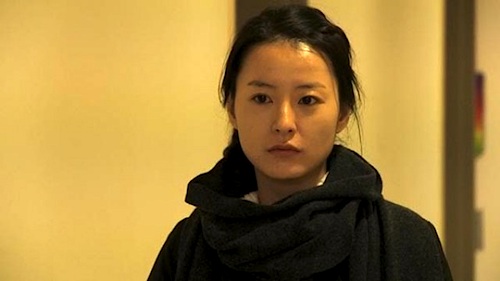By Joe Bendel. The Communists loved their paperwork and with good reason. It was one of their most effective tools for controlling people. Yet, Vacek’s mother seems to have a talent for it, navigating the red tape required for immigration while writing four scores of undeliverable missives to his defector father in Václav Kadrnka’s Eighty Letters, which appropriately screens at Bohemia National Hall as part Disappearing Act IV, the annual showcase of films unjustly overlooked after their well received festival runs, co-presented by the Czech Center.
Alarmed to find himself home alone one morning, Vanek catches up with his mother at the tram stop, essentially forcing her to take him with her on her mysterious errands. They do not talk much during the day, but they are not visiting places conducive to conversation. Confused and a bit withdrawn, Vanek whiles away the time in series doctor’s waiting rooms and government lobbies. It is not until we hear his mother’s voiceover composing another letter to his father that we appreciate how close she is to completing the deliberately arduous application process. Of course, that begs the question: then what?
Eighty is a film that refuses to look the audience in the eyes, which might be understandably off-putting for some viewers. Indeed, we watch most of Kadrnka’s pseudo-autobiographical story from sidewalk level, but there is a reason for that. The last time I was in Prague I asked my Czech friends why everyone identified me as an American before I ever spoke a word of awful Czech. My nondescript wardrobe was hardly a giveaway. They said it was because of the way I held my head up when I walked. Seeing this film helps explain that answer.

Unfolding from Vanek’s POV, Eighty is a quiet film with quite a bit of running through the streets of Prague. It could almost be considered The Red Balloon’s Kafkaesque cousin. Unfortunately, Zuzana Lapcikova and Martin Pavlus are strangely cold screen presences. However, they certainly look and feel convincing as mother and son.
Kadrnka masterfully sets the mood and frames his shots. Despite the emotional aloofness of the cast, it is an interesting film to watch purely for its craftsmanship. It is certainly worth a look, particularly this Sunday (4/15) when it screens free at BNH as Disappearing Act IV continues in New York. It is also a great opportunity to catch up with Jaak Kilmi and Kiur Aarma’s wonderfully sly and illuminating documentary Disco and Atomic War (see here and here), which also screens for free on Sunday, right before Eighty Letters.
Posted on April 13th, 2012 at 2:29pm.

